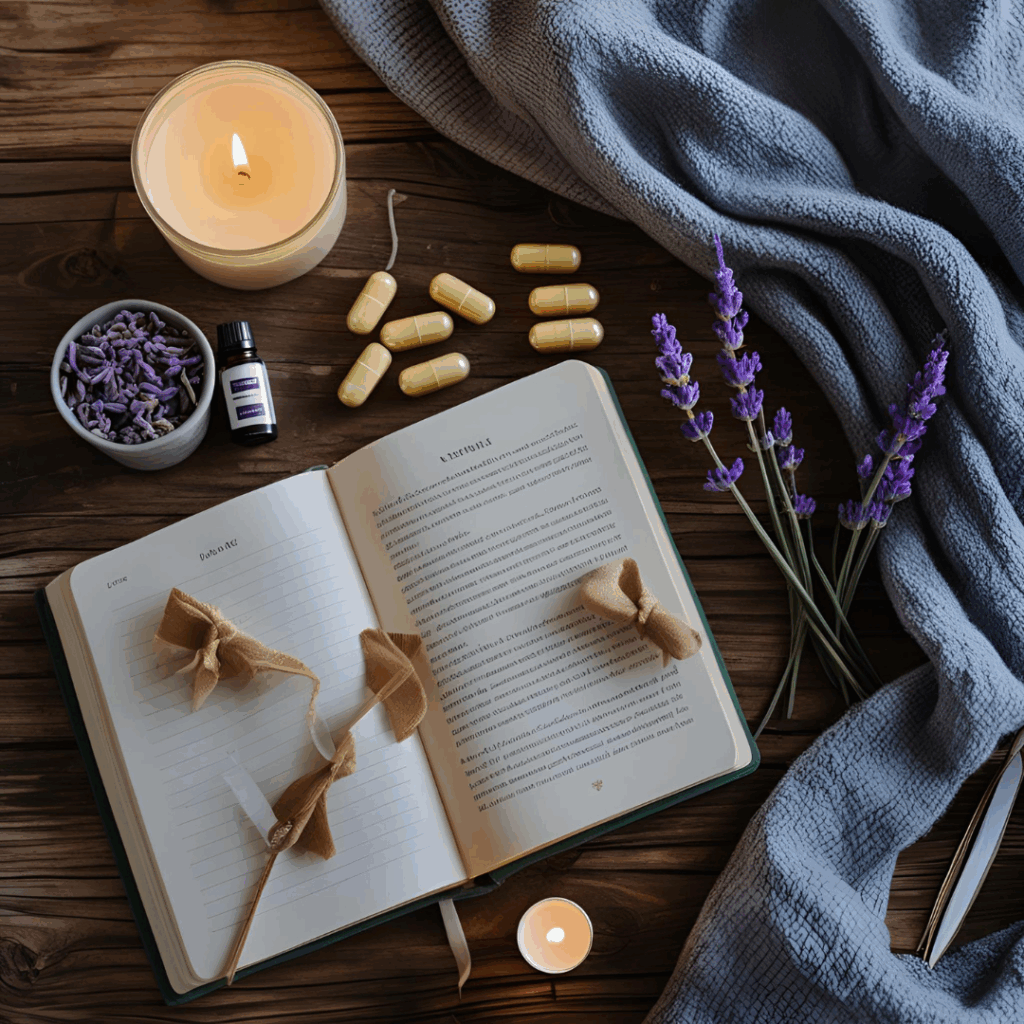✨ Why Create an Anti-Stress Nighttime Routine?
As seasons shift and daily demands pile up, nighttime anxiety often becomes an unwelcome guest, disrupting the deep, restorative sleep you desperately need. Especially in regions with shorter daylight hours, this struggle can feel even more intense.
Are you tired of staring at the ceiling, mind racing? If you’re looking to combat this cycle without resorting to medication, a natural nighttime routine can be your most powerful ally.
In this guide, you’ll discover four simple, yet incredibly effective steps to calm your mind, prepare your body for true rest, and finally enjoy the profound, refreshing sleep you deserve.
🌿 Step 1: Natural Supplements to Quiet Your Mind
L-Theanine Found in green tea, L-theanine is an amino acid that promotes a state of relaxation without drowsiness. It does this by boosting calming neurotransmitters like GABA and serotonin, which significantly help reduce stress and improve sleep quality.
Ashwagandha An ancient adaptogen from Ayurvedic medicine, Ashwagandha helps your body expertly manage stress by lowering cortisol levels. This can greatly improve your mental resilience and the overall quality of your sleep.
Quick Note on Melatonin: While many in the Northern Hemisphere turn to melatonin as a quick fix, L-Theanine and Ashwagandha offer a more holistic approach to calming the nervous system naturally, without directly inducing sleep.
Tip: Take these supplements about 30 to 60 minutes before starting your full nighttime routine to allow them to begin working their magic.

🛁 Step 2: Warm Bath Ritual with Soothing Lavender Essential Oil
A warm bath does wonders: it relaxes your muscles, lowers blood pressure, and helps gently slow down your nervous system. Lavender, renowned for its proven calming properties, only amplifies this deeply relaxing effect.
Here’s how to do it:
- Take a warm bath for 10 to 15 minutes.
- Add 5 drops of pure lavender essential oil directly to the water or to your bathroom diffuser.
- Breathe deeply, letting the soothing aroma wash over you as your body sinks into relaxation.
3️⃣ Step 3: The 4-7-8 Breathing Technique + Mindful Journaling
This simple yet powerful breathing technique helps activate your parasympathetic nervous system, the “rest and digest” mode responsible for relaxation. Combine this with journaling to help empty your mind of lingering thoughts and emotions.
How to get started:
- Breathe: Inhale gently through your nose for 4 seconds, hold your breath for 7 seconds, and then slowly exhale through your mouth for 8 seconds (making a gentle “whoosh” sound).
- Repeat this cycle 4 times.
- Journal: Afterward, spend 5 to 10 minutes writing down your thoughts. Use these prompts to help you process:
- What worried me today that’s truly out of my control?
- What were 3 good things that happened today?
- What’s one thing I can approach more calmly tomorrow?
🏃♂️ Step 4: Moderate Physical Exercise to Melt Away Anxiety
Regular physical activity isn’t just good for your body; it’s one of the most natural and effective ways to significantly reduce anxiety and enhance your sleep quality.
Types of Exercises and Their Benefits:
- Aerobic exercises (walking, light jogging, dancing): These boost feel-good endorphins, improve your mood, and help regulate your sleep-wake cycle. For beginners, aim for at least 150 minutes per week, which breaks down to about 30 minutes, 5 times a week.
- Yoga and gentle stretching: These practices promote deep muscle relaxation, relieve accumulated tension, and effectively calm the mind. They’re especially great for those who want to blend physical activity with mindful meditation. Try to practice at least 3 times a week, with sessions lasting 20 to 30 minutes.
- Light strength training: This can improve sleep quality by building healthy muscle fatigue and boosting overall body resilience. You can use light weights or your body weight, 2 to 3 times a week, in sessions of 20 to 40 minutes.
Ideal Daily Time for a Healthy Lifestyle: The American Heart Association recommends a minimum of 150 minutes per week of moderate physical activity for adults. This can be easily split into around 30 minutes daily, ideally spread throughout your week. Even if your routine is packed, 10 to 15-minute bursts of exercise throughout the day can bring significant benefits.
Best Times to Exercise: Avoid very intense workouts in the last 2 hours before bedtime, as they can activate your nervous system and make falling asleep harder. Opt for exercise in the morning, late afternoon, or early evening instead, allowing your body to fully benefit from the post-exercise relaxation.
🍎 Mindful Nighttime Eating: What to Eat (and Avoid) for Better Sleep
What you consume before bed significantly impacts your sleep quality and anxiety levels. The right (or wrong) foods can directly influence your body’s production of sleep hormones and brain activity.
Foods that promote sleep:
- Tryptophan-rich foods: This essential amino acid is crucial for producing serotonin (which promotes relaxation) and melatonin (the sleep hormone). Good sources include bananas, oats, almonds, pumpkin seeds, and warm milk.
- Complex carbohydrates: Small portions of complex carbs like a slice of whole-wheat toast or a sweet potato can help tryptophan reach your brain more effectively.
- Cherries and cherry juice: These are natural sources of melatonin and can be a great bedtime snack.
Foods and drinks to steer clear of before bed:
- Caffeine: Found in coffee, black teas, sodas, and chocolate. It stimulates your nervous system and can stay in your system for hours. Aim to avoid it after noon, or at least 6 hours before bedtime.
- Alcoholic beverages: While alcohol might initially make you feel sleepy, it actually disrupts your REM sleep (the most restorative phase) and can lead to restless awakenings.
- Heavy and greasy foods: Meals high in fat take longer to digest, which can cause discomfort and reflux, making it hard to relax and sleep.
- Spicy foods: Can cause heartburn and digestive upset, interfering with your ability to wind down.
- Refined sugars: Candies and sugary products can cause sharp spikes and crashes in blood glucose, disturbing your sleep cycle.
Tip: Try to have your last substantial meal at least 2-3 hours before you go to bed to allow for proper digestion. If you’re hungry closer to bedtime, opt for a light, easily digestible snack like a banana or a glass of warm milk.
💡 Creating Your Ideal Sleep Sanctuary: Transform Your Bedroom into a Haven
Your sleep environment is just as crucial as your pre-bedtime routines. A well-prepared bedroom signals to your body that it’s time to relax and sleep, while an unsuitable one can perpetuate anxiety and sleeplessness.
Key elements for your ultimate sleep sanctuary:
- Darkness: Light, especially blue light, inhibits melatonin production. Invest in blackout curtains or blinds to block out any external light. A sleep mask can also be a game-changer.
- Especially during summer months with longer daylight hours or winter with early sunsets, creating a truly dark sanctuary helps your body recognize it’s time to wind down.
- Silence: Noise can disturb your sleep, even if you don’t fully wake up. Consider using earplugs or a white noise machine (which can mask unwanted sounds and create a consistent, relaxing audio environment).
- Cool Temperature: Most people sleep best in a cooler room. The ideal temperature is generally between 18°C and 22°C (65°F and 72°F). Ensure your room is well-ventilated.
- Comfort: Your mattress and pillows should be comfortable and provide adequate support for your needs. Clean, soft linens also significantly contribute to a sense of well-being and luxury.
- Organization and Cleanliness: A cluttered or messy room can contribute to feelings of stress and anxiety. Keep your space clean, tidy, and free of unnecessary clutter to promote a calm mind.
- Subtle Aromatherapy: Beyond lavender in your bath, consider using a diffuser with calming essential oils like chamomile, sandalwood, or bergamot in your bedroom about 30 minutes before bedtime.
- No Distractions: Crucially, remove all electronics (TV, computer, phone) from your bedroom. Your bedroom should be solely associated with sleeping and relaxing, not with work, study, or entertainment.
Tip: Create a ritual of “closing down” your home before bed. This could include dimming lights, ensuring doors are locked, and preparing your bedroom for the night. This ritual powerfully signals to your brain that the day’s activities are over and it’s time to prepare for rest.
🎨 The Importance of Fun and Leisure: Anxiety’s Secret Weapon
In our fast-paced lives, it’s easy to overlook the transformative power of fun and genuine leisure for mental health. Taking time for truly enjoyable activities—those with no other purpose than pure pleasure—is a potent antidote to stress and anxiety. Fun stimulates the release of endorphins, our natural “feel-good” hormones, providing a much-needed mental break from daily worries.
How to integrate fun into your routine:
- Schedule “Playtime”: Just like important appointments, actually schedule moments for activities you genuinely love. This could be listening to your favorite music, dancing freely, diving into a captivating book, painting, enjoying a board game, or watching a hilarious movie.
- Connect & Laugh: Spending time with friends or family, sharing laughter, and having lighthearted conversations are fantastic ways to release tension.
- Explore New Hobbies: Try something new that sparks your curiosity, without any pressure for perfection. The journey of learning itself can be incredibly fun.
- Banish Guilt: Many feel they “don’t deserve” to have fun or that it’s a waste of precious time. Remember: leisure is a necessity, not a luxury. It recharges your energy and significantly boosts your resilience.
- Disconnect to Truly Connect: Turn off notifications and resist the urge to multitask. Fully immerse yourself in the moment of leisure, whatever it may be.
Fun not only provides immediate stress relief but also builds an emotional reserve, equipping you to better handle future challenges. Consider it a vital investment in your peace of mind.
📱 How Electronic Use Hijacks Your Sleep
The blue light emitted by phones, tablets, and computers dramatically inhibits your body’s production of melatonin, the crucial hormone that regulates sleep. This throws off your natural circadian rhythm.
The Impacts:
- Significant difficulty falling asleep.
- Less deep and truly restorative sleep.
- A greater feeling of exhaustion the following day.
Tips to Minimize the Impact:
- Turn off all electronic devices at least 1 hour before bed.
- Utilize blue light filters or “night modes” available on most smartphones and computers.
- Opt for traditional paper books or audiobooks as you wind down before sleep.
⏰ Your Nighttime Routine for Busy Lives
Modern life moves at lightning speed, and finding time for self-care often feels impossible. But here’s the great news: even with just a few minutes, you can effectively implement a simplified version of this routine to ease anxiety and ensure truly restorative sleep.
How to adapt each step with limited time:
- Natural Supplements: Take your supplements as soon as you get home or while preparing dinner. They’ll start working while you handle other tasks.
- Quick Relaxing Bath: A warm 5-minute shower or bath can still work wonders. Just drip a few drops of lavender essential oil into your palm and inhale the aroma deeply as the warm water hits you.
- Breathing + Express Journaling: Do the 4-7-8 breathing technique for just 2 cycles (1 to 2 minutes). For journaling, simply jot down 3 quick sentences about your day or key emotions – even a note on your phone works.
- Quick Physical Exercise: Fit in a brisk 10-minute walk or some gentle stretches while listening to your favorite calming music. If evening workouts are impossible, try to squeeze in activity throughout your day, even during a work break.
- Instant Fun: Dedicate just 5-10 minutes to something that genuinely brings you joy – listen to a favorite song, watch a silly short video, or do a quick doodle.
Extra tips to fit the routine into a packed schedule:
- Set a gentle alarm to remind yourself to start winding down.
- Use timers for your bath and journaling to keep things efficient.
- Prepare your relaxation space in advance: essential oil, notebook, and comfy clothes ready.
- Commit to disconnecting from screens just 30 minutes before bed, even if it’s just muting notifications.
Benefits of Adapting, Even with Little Time: Consistency, however brief, truly outweighs duration. These small, consistent pauses will help you:
- Significantly reduce the pressure of daily stress.
- Create a precious moment of self-care and presence with yourself.
- Prepare your mind for deeper, more restorative sleep.
📚 Free E-book: 7 Nighttime Rituals for Deep Sleep
Ready to dive deeper? Download our absolutely free e-book, packed with even more rituals, guided meditations, and practical tips for truly tranquil nights. 👉 Click here to download your free e-book [insert link]
💸 Monetization: How to Monetize Your Wellness Content
- Affiliate Marketing: Promote supplements, essential oils, and journaling supplies that are popular and available in your target markets (e.g., Amazon US/UK/Canada links for brands like NOW Foods, Plant Therapy, Moleskine).
- Google Ads (on your site): Leverage high CPC keywords related to anxiety and sleep to earn from ads displayed on your page.
- Digital Products: Offer premium e-books, online courses, or guided meditation packages on natural anxiety management and sleep improvement.
💤 Calming Routine Summary
| Step | Action | Key Benefit |
| 1. Natural Supplements | L-theanine + Ashwagandha | Reduces anxiety, improves sleep quality |
| 2. Warm Bath with Lavender Oil | Relaxes body and mind | Deep relaxation, stress release |
| 3. 4-7-8 Breathing + Journaling | Slows thoughts, promotes mental calm | Clears mind, activates relaxation response |
| 4. Moderate Physical Exercise | Boosts endorphins, regulates sleep | Reduces anxiety, enhances sleep quality |
| 5. Mindful Eating | Choose sleep-promoting foods wisely | Aids digestion, supports restful sleep |
| 6. Ideal Sleep Environment | Create a serene bedroom sanctuary | Signals body for sleep, minimizes disruption |
| 7. Fun & Leisure | Dedicate time to joyful activities | Relieves stress, recharges mental energy |
| Crucial Tip | Avoid electronics before bed | Protects melatonin, improves sleep rhythm |
💖 Self-Care is the Cornerstone of Well-being
Taking dedicated time for self-care at night isn’t just an act of kindness; it’s a profound investment in your physical and mental health. By building a simple routine that includes moments of genuine pleasure and mindful preparation, you empower your body and mind to truly rest. This allows you to effectively ward off anxiety and prepare for brighter, lighter, and more productive days ahead.







